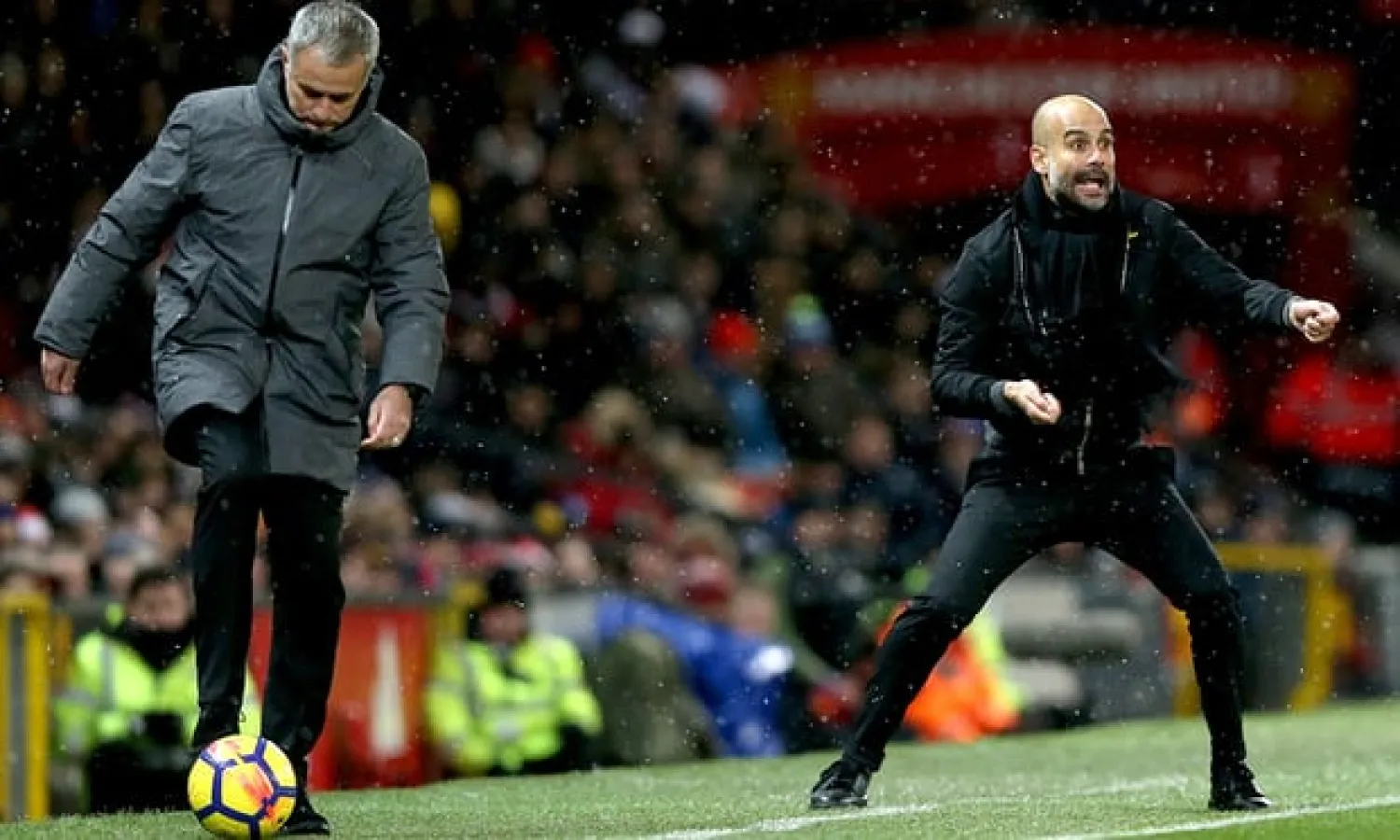About 10 minutes before half-time, the plea went up around Old Trafford: “Attack! Attack! Attack!” It’s a chant that dates back to the 1960s. It was heard, for instance, at Wembley in 1968 when Manchester United beat Benfica to win the European Cup as fans revelled in the refusal of Matt Busby’s side to rest on a 1-0 lead even in a game so freighted with emotion and importance. By Louis van Gaal’s time, the chant had taken on a different tone: something between mockery of an approach based on risk-free possession and a demand for something more uplifting. It’s hard to interpret this latest outbreak as being anything other than a complaint.
José Mourinho was always going to have his side sit deep. That’s just how he plays in big games and the evidence of City’s last three league games – and particularly Pep Guardiola’s evident frustration at the approach – was that City don’t find it easy against teams who set out with few ambitions but to deny them space. This City pose challenges few other teams have ever posed: Mourinho’s approach was both predictable and, up to a point, understandable. But only up to a point.
That he began with Marcus Rashford, Jesse Lingard and Anthony Martial behind Romelu Lukaku was misleading. Four forwards looks positive, but he did that at Internazionale as well, when he would field Goran Pandev, Wesley Sneijder and Samuel Eto’o behind Diego Milito and, in big games, watch them defend with great discipline. Mourinho’s greatest gift, perhaps, is his capacity to persuade forwards to defend. That, and the management of expectations.
United’s front four did defend: clumsily and, as it turned out, counterproductively in the case of Lukaku, efficiently and diligently in the case of the wide men tracking the full-backs. At half-time, City had had 75% of the ball and United only three shots.
Little wonder, then, that some home fans became a little restive as they watched a string of long punts aimed in the vague direction of Lukaku, or at least the half of the pitch in which he was mournfully loping. Reactive football is, after all, as the great Russian writer Lev Filatov put it, justifying Krylya Sovetov’s use of a proto-catenaccio in the early 50s, the “right of the weak”. But United are not weak; they are the richest club in the world. Playing like that sits uncomfortably with their self-image. What may work at Chelsea or Porto or even Inter, where reactivity can be accepted as necessary to take on the establishment, doesn’t work when you are the establishment, as United are, as Real Madrid are.
United had played like this against Tottenham, waiting for a mistake that did eventually come. They had played like this at Liverpool, waiting for a mistake that never came. Here, there were mistakes and they served to highlight how many more there might have been had United just applied a little more pressure a little earlier in the game. City, having dominated, became oddly sloppy in the five minutes before half-time. Their opening goal came just after a couple of uncharacteristic misplaced passes, as though they had mesmerised themselves with their possession. Three mistakes in dealing with one simple cross led to the equaliser. At no stage did City seem comfortable dealing with direct balls.
Nicolás Otamendi had one of his shaky days. Fabian Delph for once looked like a midfielder playing at the back, as did Fernandinho for the quarter of an hour he did so before being rescued by the introduction of Eliaquim Mangala. Lukaku and Rashford had chances even before the Ederson double save. With five minutes to go, City were rattled enough to take the ball into the corners, despite their manager’s oft-expressed ideological commitment to attacking football.
City were vulnerable and United, just as against Liverpool, not only did not take advantage but did not seek to take advantage. There is a line between reactivity and passivity and in the first half United were on the wrong side of it. When Mourinho did finally have a go, it was two hours too late and he was complaining about the volume of the music in the visitors’ dressing room. United are not, to use the metaphor Mourinho himself deployed in his first season back at Chelsea to pre-empt and explain the failure of a nascent title challenge, a “little horse”. They are Manchester United, the biggest, most successful team in English football, and their transfer spending is a net £250m in the two years he has been there. A team of that stature cannot be reliant on Paul Pogba – and certainly not on Marouane Fellaini.
Even in the corporatised, sanitised modern Old Trafford fans expect more than that, and directors will come to. Fans, by and large, will accept any means if the ends follow. Sir Alex Ferguson was not the habitual cavalier many like to portray him as, but he won.
Resistance for now is limited but the bigger the gap at the top of the table becomes, the more stylistic questions are going to be asked: why betray tradition or self-image, romanticised as it may be, if the result is defeat? And particularly when the suspicion is that a more proactive, more palatable approach might actually have been more effective, might have exposed an opponent’s weaknesses?
And this is the second season. This is supposed to be Mourinho’s golden time before third-season syndrome strikes.
The Guardian Sport









